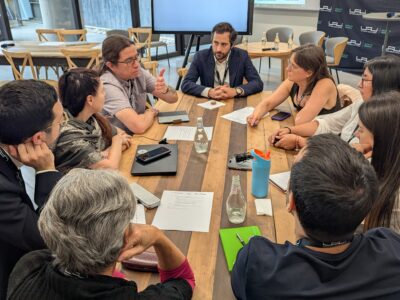“A Historic Day”: the World Court’s Big Climate Opinion
UCLA Law’s Anna Spain Bradley offers takeaways from the International Court of Justice’s Advisory Opinion on the Obligations of States in Respect of Climate Change.

It’s been a long time coming but nations of the world officially have a legal obligation to limit their emissions of greenhouse gases or else pay reparations for the harms of climate change. That was the unanimous opinion handed down yesterday by the 14 judges on the International Court of Justice, sometimes called the World Court. The Advisory Opinion, though technically non-binding, affirms the existence of a legal right to a “clean, healthy and sustainable environment” under international law and extends this and related rights to the context of climate change. The case was filed in 2018 by Vanuatu, an archipelago in the Pacific Ocean that is especially vulnerable to human-caused climate change. Hearings took place last December.
“July 23, 2025 is a historic day for international law, for climate change, and for humanity,” UCLA Law Professor Anna Spain Bradley told me.
I asked Professor Spain Bradley to break down the court’s advisory opinion and share some of her observations. Spain Bradley is Faculty Director of both the Promise Institute for Human Rights at UCLA and the Promise Institute Europe at UCLA School of Law. She’s also affiliated faculty at the UCLA Emmett Institute. (The Promise Institute Europe, led by Professor Kate Mackintosh, appeared before the ICJ on the case and convened a conference in May 2024 to explore the issues involved.)
The following transcript has been edited lightly for clarity.
Q: What was your initial reaction upon reading the opinion?
A: The Advisory Opinion sets the stage for nations to be held liable if they don’t effectively curb harmful emissions and pay reparations. This decision certainly didn’t seem possible when I started my career working at the U.S. EPA on climate change back in 1999 participating in COP6 and later COP15 as a civil society delegate. From a scientific perspective, the urgency of getting all nations and peoples behind reducing the global temperature now has been painfully clear for a long time. The ICJ made it clear yet again, this time with legal consequences.
I was impressed by the Court’s treatment of climate change as both an urgent challenge and one invoking nations’ obligations erga omnes, owed to the international community as a whole. I was particularly struck by the Court’s language in the opinion’s closing paragraph, both because of its eloquence and because of its uncharacteristic personal touch. There, the 14 judges speak with one voice stating “the questions posed by the General Assembly represent more than a legal problem: they concern an existential problem of planetary proportion that imperils all forms of life and the very health of our planet. … Above all, a lasting and satisfactory solution requires human will and wisdom…to change our habits, comforts, and current way of life in order to secure a future for ourselves and those who are yet to come.”
Even the most skeptical among us can find room to be impressed by the Court’s much needed leadership on an issue affecting the very survival of our human species and the planet.
Q: Say more about the context that led to this opinion and what you think the big takeaways are.
A: As background, the ICJ ‘World Court’ was established in 1945 by the United Nations Charter as the UN’s judicial organ responsible for peacefully settling disputes between nations that could be decided on the basis of international law. It also provides legal advice, in the form of Advisory Opinions, to the United Nations General Assembly and the United Nations Security Council upon their request. The UN General Assembly requested this Advisory Opinion just two years ago. At over 450 pages, there’s much to consider. I’d offer three initial reactions.
First, the ICJ affirmed that climate change is a real threat to humanity and further affirmed the importance and value of science and scientific evidence, notable at a time when both of these messages are being challenged by certain governments and industries.
Second, this Advisory Opinion is powerful in that it speaks with the full unanimous support of all 14 judges. Not all Advisory Opinions do so: The Advisory Opinions dealing with The Legality of the Threat or Use of Nuclear Weapons (1996), Legal Consequences of the Construction of a Wall in Occupied Palestinian Territory (2004) are noted for their dissents.
Third, there will be novel legal consequences for nations arising out of this Advisory Opinion. In answering the questions the UNGA posed, the ICJ responds by articulating what nations are obligated to do under existing types of international law. Looking to the Law of the Sea, notably the UNCLOS treaty, the Court advises that nations are under a stringent standard of due diligence to prevent and reduce marine pollution (Para 347). Looking at international human rights law, the Court states that these existing obligations stand on the precondition of “the right to a clean, healthy and sustainable environment” (Para. 393). Treaty-based rights depend largely on the initial goodwill of nations ratifying a treaty and subsequent effectiveness regarding the enforcement of those treaties.
Then, there is the matter of international customary law, a source of law applying to all nations, no treaty required. This Opinion clarifies that all nations have a duty to prevent significant harm to the environment and to protect the environment as a matter of customary law. It also extends those duties “in respect of climate change.” (Paras. 271, 273)
Q: How could this opinion affect global litigation?
A: By laying down the existence of a legal right to a healthy, clean and sustainable environment and the legal duty to prevent significant environmental harm in relation to climate change, this Advisory Opinion certainly opens up new lanes for holding nations responsible through international, transnational and other litigation. ICJ Advisory Opinions are not binding on nations in the way that ICJ decisions in contentious cases are. However, they are influential as subsidiary sources of international law. The ICJ and other courts will rely on this decision and the opinio juris it captures as persuasive legal authority in future cases.
Q: Any concerns about what could come next?
A: As with many areas in law, litigation can sometimes do more collective harm than good. While there can be meaningful gains for parties to a particular litigation, gains made in litigations are not structured to be holistic or equitable, helping the nations and peoples who need it the most. I also think we need to take care to avoid over-reliance on litigation to solve large-scale human challenges, as the ICJ notes in the Opinion’s final paragraph. So much of the work of preventing, mitigating and adapting to climate change requires a fundamental shift in how humans live on Earth. I hope that the excitement about new lanes for climate change litigation will not harmfully detract from limited resources, political will and public attention needed to effect large-scale, systemic change.
Q: What does it say that small island states were able to trigger this big result?
A: Take a look at the list of all the nations from around the world that submitted written statements to the ICJ in this matter. We are seeing a higher level of participation than is normally the case at the ICJ, with Vanuatu and many nations in Oceania as well as powerful participation by Caribbean countries leading the way along with states in Africa and Asia. Robust and globally diverse participation is good for international law and necessary for international justice. It should be applauded, and the world should take note.
Q: Any reflections on the convergence of international human rights and environmental law?
A: There’s a lot in this Advisory Opinion that will impact thinking about both those areas of law and, importantly, the intersections between them. At once, the very nature of climate change is holistic and broad. As Judge Tladi stated in his Declaration p. 1, “[t]he subject-matter of this Advisory Opinion concerns one of the most consequential issues in the history of the Court. … the potential impact of climate change … is not limited to one geographical situation.”
At the same time, the Court has set up various rights, duties and obligations under particular spheres of international law. At paras 387-393, the Court sets up the “the right to a healthy, sustainable environment” as an obligation of states under international human rights. It sets forth other obligations states have under the Law of the Sea and environmental treaties. Importantly, it reaffirms that international customary law, which all nations are bound by, creates a duty to prevent significant environmental harm. Some of this jurisprudence covers old ground while some seems to establish new ground. I’m interested in how the Court’s understanding of these distinct legal frameworks do, and do not fit, together.
Q: What might be the impact on how you teach law students in the years ahead?
A: There’s a lot to learn from this Advisory Opinion about international law in general and about the ICJ’s role in the international legal system, in particular. There’s also much to learn about judicial decision-making and how particular ICJ judges interpret law. I always encourage students to read the Separate Opinions and Declarations with care. Here, we have a case where all 14 ICJ judges agreed unanimously to the Advisory Opinion and 11 judges also felt compelled to put down a Separate Opinion and/or Declaration. It is vital to understand why, and this is often where you glean the most about the meaning and limits of the Court’s Advisory Opinion.
Finally, people are right to feel inspired by this decision. We are living through a period of unprecedented change in human history. As I’ve said before, for the world and humanity to survive into the future, we must develop the international law we need. With this Advisory Opinion, the ICJ has broken new ground in that direction, offering the world a small, but much needed, sense of hope.
Reader Comments
One Reply to ““A Historic Day”: the World Court’s Big Climate Opinion”
Comments are closed.







There’s a lot to learn from the opinion. But in the US at least it will be at minimum ignored, and possibly deliberately opposed. With EPA’s Endangerment Opinion removed (as now to be proposed) there will be no basis for climate change-related measures in the US. An in fact the opposite: enhancement of climate change might be considered such as enhancing fossil fuel production and use coupled with restrictions and bans of low-emission approaches.
One of the religious goals of the far right is to bring about the Apocalypse.